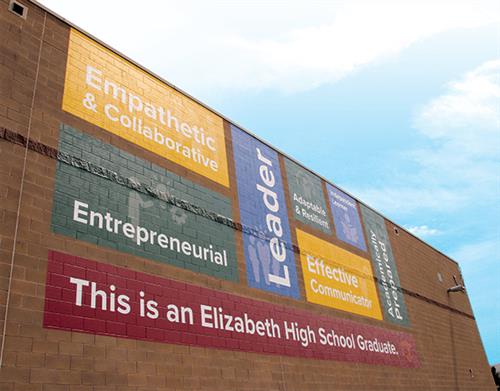Career Exploration
Page Navigation
-

Options for career exploration at EHS
At EHS, dozens of students take courses for college credit via concurrent enrollment taught by Elizabeth teachers. Some classes are taught at EHS, others are online community college classes online and still others, such as in art, literature, psychology and math, are available at the Arapahoe Community College campus.
Students can receive workforce opportunities and official certification for Adobe software usage, automotive repair, certified nursing assistant training, cosmetology, cybersecurity, welding and more. Students gain skills that could land them employment right out of high school.
Students who take concurrent enrollment classes in composition and literature at EHS could start college with as many as 12 credits – a full semester’s worth – thanks to partnerships with ACC. Likewise, certain business classes offered here are tailored to have the same curriculum, quizzes and tests as what first-year students at Metro State University receive on campus.
All of that work feeds into the idea of giving EHS students the opportunities to choose specific career pathways to prepare them for life after high school. Pathways provide defined lists and groupings of classes that can best set students up for success, whether they choose pathways that offer direct employment after graduation or pathways that require further training in college.
In 2023-24, 181 students had internships that gave them real-world experience in fields they are considering for their career paths. Internships provide the chance to see what those jobs might be like before investing thousands of dollars in postsecondary education only for some students to find they don't actually want a career in that field. For others, internships help students confirm their choice and step confidently into the post-graduation world of work and/or school. Some interns have learned they were on the right track but needed to modify their plans, such as someone who wanted to become a small-animal veterinarian and realized they really want to work with large animals instead.
Check out the Career Explorers page to see almost two-dozen examples of student internships and what the students learned.
-
Career Exploration
Another important aspect is preparing younger students to think about life after high school. A critical aspect added at EHS this year is called Cardinal Ground School.
The ninth-grade class is divided among five educators who all teach the same career prep curriculum -- with a new theme each week. Science teacher Lilyann Lambert is one of those five teachers and was on site at the open house to speak with students and parents about Cardinal Ground School.
She explained that the main focus is helping students learn what it takes to be a good employee “so they’re more prepared for life after high school, whether it’s going to college or whether it’s going into the workforce.
Each week’s focus is on different hard skills and soft skills, including good communication, dressing appropriately for a particular job, career aptitude tests, coping with conflict, knowing one’s own personality, setting oneself apart, networking, public speaking, different types of work, workplace etiquette and more.
Workforce Training During and After High School
Several post-secondary institutions were represented as well, including some that focus on workforce readiness.
Jenise Rosa of Pickens Technical College and Brian Treesh of Spartan College of Aeronautics and Technology each had lines of students and parents for the entire evening. They explained how students with a variety of aptitudes can find a career path that fits them. Students can acquire state-of-the-art skills and important work habits that will help them succeed in the workforce.
-
Learn about the Homegrown Talent Initiative elsewhere in the district

